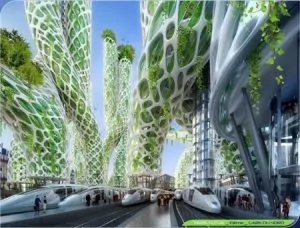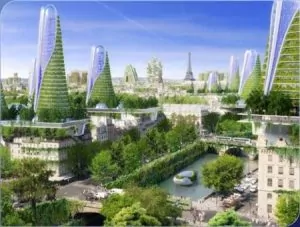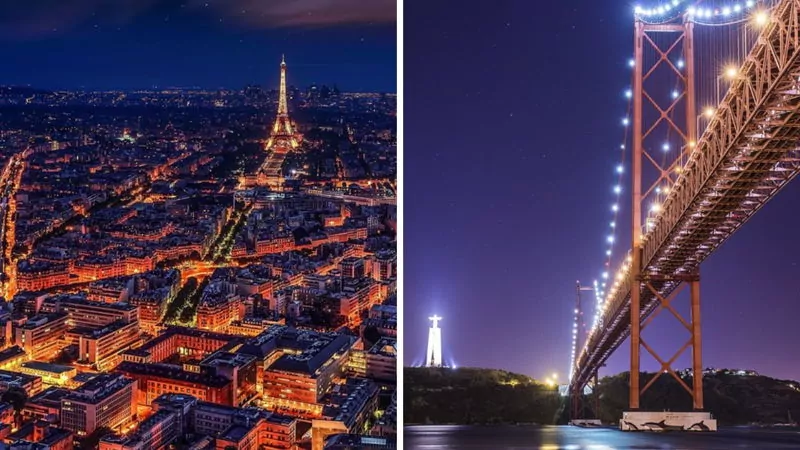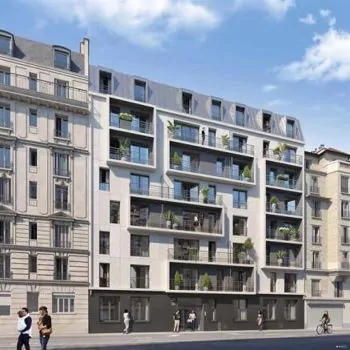Smart City: Paris, France
Among Europeans, Paris has never been famous for being green, not in terms of recycling, emissions, or how many parks it has. However, the City of Light is about to change…
In 2015, Paris launched its Smart and Sustainable Paris initiative. Part of this project includes Smart 2050 by architect Vincent Callebaut. Under this architectural project, high-rise buildings will integrate several smart energy-production techniques to lower their energy demand and encourage inhabitants to be eco-friendly in their daily lives.
Each building will have its own unique energy-producing system using nature and smart technology. Its technology serving you, without you needing to understand it… just reap the benefits…
Here are some examples:
- Plastering foliage over the exterior of buildings to improve air quality and offset transport emissions.
- Adding ducts and chimneys to make heat-captivation and cooling mechanisms more efficient.
- Covering buildings with a “skin” composed of individual cells that form a photosensitive electrochemical shell, utilizing captured sunlight and turning it into electricity (these buildings will be called Mangrove Towers).
- Providing buildings with an insulating bio-façade that generates usable biofuel (these buildings will be called Photosynthesis Towers).
In public areas around these futuristic buildings, Paris will implement green parks and “phylolights,” a smart hybridized turbine-lamp system that supplies both lighting and the energy needed to produce illumination. Also, more mixed-use buildings (residential mixed with retail and coworking space) will be constructed to reduce commuting time and costs and lower transport emissions. It is Paris playing smart to bring you back to nature and make urban life just that little bit more natural and pleasant.
Who Doesn’t Want To Live In Paris?


People often sigh when they say “Paris,” as if living there is just too unreachable a dream. But this needn’t be the case…
Global Property Advisor is one-of-a-kind, internationally focused real estate service that explains where, what, when, and how you can invest in Parisian property. My featured market study on France‘s capital explains how you can make Paris’ smart living your reality…
I’d like to offer you a free copy of the market study here. At the moment, a one-bedroom apartment in the 18th arrondissement is going for 233,000 euros.
Smart City: Lisbon, Portugal
Lisbon’s smart-city strategy puts tourists up there with locals.
Over the coming few decades, the city council is investing 307 million euros to make Lisbon more attractive… Energy efficient housing, e-mobility, smart living, and smart-aging solutions are all on the to-do list.
For a city to be smart, all the cogs of its wheel must be grinding harmoniously, without any one aspect of society jamming up the mechanism. It’s all about collective thinking. This means legislation comes into play, and politics works with technology.
Portugal’s capital is proving that it’s possible to live on renewable energy and use smart technology to create sustainability—something that’s going to benefit you and your grandchildren.
At the moment, Lisbon is:
- Installing smart meters that limit maximum electricity flow and allow homeowners to better understand and control their energy consumption.
- Developing a system that allows surplus energy produced by privately owned photovoltaic panels to be carried over to other areas such as electric car powering stations.
- Using smart meters to map energy production and consumption throughout the city, allowing for better overview and control of the energy grid.
This city’s also striving for better mobility through smart technology (something that benefits locals and tourists alike):
- The city is installing monitoring systems that better control traffic flow according to air quality; for example, the timing of red lights could be adjusted to avoid stop-start driving patterns that contribute to particulate matter emissions.
- Lisbon is adapting street lighting based on pedestrian and vehicle flows, so that lighting can be dimmed when no traffic or pedestrians are detected (a little like slowing escalators that speed up when you step onto them).
- The capital is seeing an uptake of electric bikes and reducing the use of private vehicles through its park and e-bike scheme that offers incentives such as lower parking charges to encourage people to park their cars and opt for e-bikes in areas where air pollution is bad.
- Municipal vehicle fleets are adopting more electric vehicles to lower costs and improve energy efficiency.
Watch This Space
Although Lisbon is the most all-encompassing smart city—it ticks so many requirements on the list of what makes a city smart, it is undisputedly king—other Portuguese cities are also adopting smart-city characteristics.
In a 2015 smart cities report, Bragança, Porto, and Oeiras ranked highly in terms of policies, strategies, and smart projects implemented by private stakeholders and the government. Smart building construction, smart mobility, smart energy, and smart intelligent services were all analyzed and the report concluded that, “with the exception of Porto, which is on average, these municipalities have a very above average economic, demographic and ICT [information and communications technology] use performance.”
Making It Happen
The best way to get your foot in the door of Lisbon is through Portugal‘s Golden Visa program. This gives you EU residency… a chance to live smart and improve your well-being.
Real estate is one of the accepted forms of investment for Portugal’s Golden Visa. I invite you to read my GPA study on Lisbon’s property market. As in the Paris market study, we explain what, where, when, and how you can make a property investment in Lisbon. We also cover the up-and-coming market of Oeiras, close to Lisbon.
As discussed at the Live and Invest in Portugal Conference last September, the Golden Visa requires a minimum investment of 500,000 euros, cash. The 500,000 euros could be from one or more properties. Although the real estate can cost more than 500,000 euros, the cash part must constitute half a million euros.
However, half a million is actually a little misleading. Your dream is far more tangible than that. If you buy a piece of property that is more than 30 years old, the investment threshold is reduced to 350,000 euros. If you invest in an area with a low population density (fewer than 100 people per square kilometer), you are eligible for an additional 20% discount (but bear in mind cities often have a high population density). Taking into account all discounts available, the lowest investment threshold is 280,000 euros.
Samantha Russell



